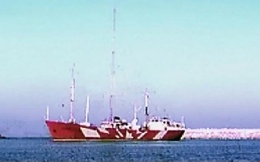© 2014-


Mebo off Libya - History
Legal action involving former the Radio North Sea International (RNI) ship Mebo II continued in Holland throughout 1975. Mebo Ltd. were pursuing a claim in the Dutch courts for repayment of harbour fees incurred while their two ships, Angela and Mebo II had been forcibly detained during 1974/75.
By the end of January 1976 the ships were free to leave Holland and had reportedly been sold to an un-
In November 1976 both ships were dry docked once again to be cleaned and re-
Finally in January 1977 the Dutch authorities issued a statement saying:-
Following this announcement both ships were given engine trials in harbour and on 14th January, after inspections by Customs officials they left the de Groot van Vliet shipyard and sailed into Rotterdam to take on supplies.
While docking in Rotterdam the Mebo II collided with another ship causing damage and the authorities immediately placed a detention order on the radio ship, fearing she would leave port without paying for the damage. However, the costs were met by Mebo Ltd. and on 16th January 1977 both vessels left Holland, sailing south towards a new destination and a new role in the Mediterranean which was to be unlike anything ever experienced by an offshore radio station before or since.
Both ships had Dutch Captains and engineers on board but the marine crew were mainly from the Cape Verde Islands. Also on board the Mebo II was ex-
After the two vessels had sailed under the bridges of Rotterdam they were tied to the Parkkade Pier to have supplies loaded for their forthcoming voyage to a destination which at that time remained a mystery. Whilst tied up the Mebo II struck another ship, the West German vessel Estebrugge, which in turn shunted into two other ships causing £3,000 worth of damage. The owners of the Estebrugge insisted that the Mebo II be detained until repair work had been completed and paid for.
Once repair work to the damaged ships had either been completed or covered by insurance guarantees both the Mebo II and the Angela finally sailed from Parkkade on 26th January 1977. The two ships dropped anchor in international waters for the night before setting off on their voyage to Tripoli, Libya. Bad weather slowed the journey and after calling at Ceuta, a Spanish harbour in Morocco on 1st February 1977 to take on fresh supplies of food, fuel and water both ships eventually arrived off Tripoli on 9th February. However, it was not until five days later that they were allowed to enter Tripoli Harbour when the Libyan authorities had satisfied themselves that the vessel's registration documents were in order. At this time, too, the crew were all paid off, although radio engineer Robin Adcroft remained on board the Mebo II.
During February and March 1977 a number of test transmissions were made by Robin Adcroft from Tripoli Harbour. These transmissions took place generally between 8.00pm and 11.00pm local time and consisted of records and announcements, but there were no station identifications. Later some tests were also made using the ex-
These test transmissions had to be halted after a few weeks because it was discovered that they were causing interference to local communications facilities in the Tripoli area. A further series of test transmissions from the Mebo II began on 2nd May 1977 on shortwave , medium wave and FM. Again the tests were presented by Robin Adcroft and consisted largely of music and announcements, but this time knowing that some European offshore radio enthusiasts would probably be listening on shortwave, the occasional RNI jingle was inserted between records. At the top of each hour the former RNI theme, "Man of Action" was also played.
On 19th May 1977 test transmissions also started in the 31m shortwave band, making a total of four transmitters broadcasting simultaneously from the Mebo II -
By 29th June 1977 th e transmitters on the Mebo II were being used to relay the English language programmes of the Socialist People's Libyan Arab Jamahiriyah Broadcasting Corporation (SPLAJBC), which was itself transmitting from Tripoli. These relays, which were arranged by Robin Adcroft on instructions from Mebo Director Edwin Bollier in Switzerland, were thought to have been for the benefit of Libyan Embassies throughout the world. However, no feedback was received from this potential audience and the broadcasts from Mebo II stopped after about two weeks.
e transmitters on the Mebo II were being used to relay the English language programmes of the Socialist People's Libyan Arab Jamahiriyah Broadcasting Corporation (SPLAJBC), which was itself transmitting from Tripoli. These relays, which were arranged by Robin Adcroft on instructions from Mebo Director Edwin Bollier in Switzerland, were thought to have been for the benefit of Libyan Embassies throughout the world. However, no feedback was received from this potential audience and the broadcasts from Mebo II stopped after about two weeks.
On 8th August both the Mebo II and the Angela sailed from Tripoli Harbour arriving three days later, first at Benghazi and finally at Derna Harbour -
Transmissions under the call sign LBJ -
At this stage programmes consisted of music, with no propaganda or information, and continued for about five hours each night, half of that time being live programmes presented by Robin Adcroft and the remainder pre-


Click on picture to enlarge

History
Key Dates
Ship and Location
Technical
Staff




Mebo II off Tripoli in 1977
Photo: Robin Adcroft

Thanks to the late Robin Adcroft who provided additional information about the Mebo II’s time off Libya

Back to Mebo off Libya


Back to Rest of the World Gallery
